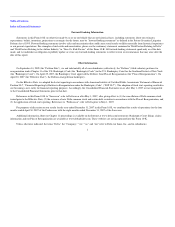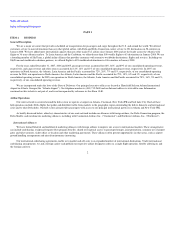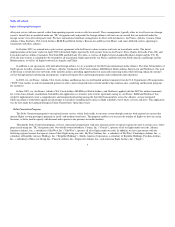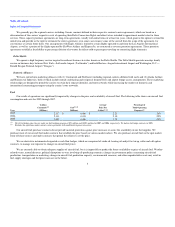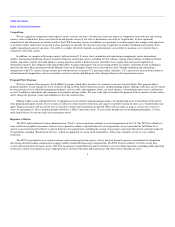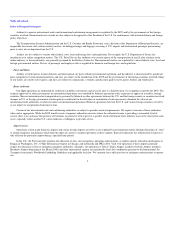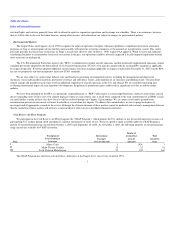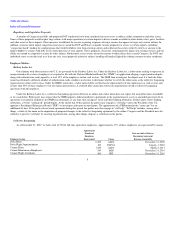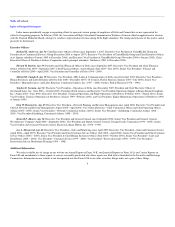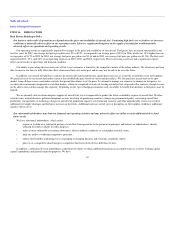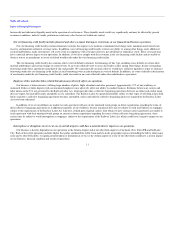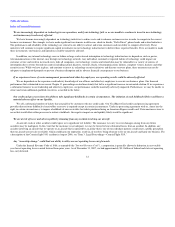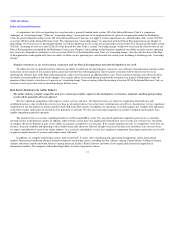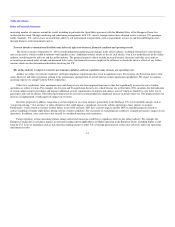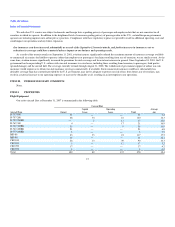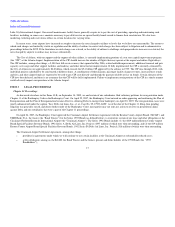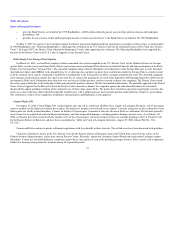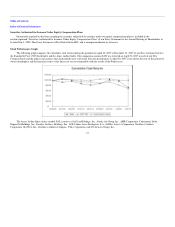Delta Airlines 2007 Annual Report Download - page 16
Download and view the complete annual report
Please find page 16 of the 2007 Delta Airlines annual report below. You can navigate through the pages in the report by either clicking on the pages listed below, or by using the keyword search tool below to find specific information within the annual report.
Table of Contents
Index to Financial Statements
historically had substantial liquidity needs in the operation of our business. These liquidity needs could vary significantly and may be affected by general
economic conditions, industry trends, performance and many other factors not within our control.
Our exit financing credit facility includes financial and other covenants that impose restrictions on our financial and business operations.
Our exit financing credit facility contains financial covenants that require us to maintain a minimum fixed charge ratio, minimum unrestricted cash
reserves and minimum collateral coverage ratios. In addition, our exit financing credit facility restricts our ability to, among other things, incur additional
secured indebtedness, make investments, sell assets if not in compliance with coverage ratio tests, pay dividends or repurchase stock. These covenants may
have a material adverse impact on our operations. In addition, if we fail to comply with the covenants in the exit financing credit facility and are unable to
obtain a waiver or amendment, an event of default would result under the exit financing credit facility.
The exit financing credit facility also contains other events of default customary for financings of this type, including cross defaults to certain other
material indebtedness and certain change of control events. If an event of default were to occur, the lenders could, among other things, declare outstanding
borrowings under these agreements immediately due and payable. We cannot provide assurance that we would have sufficient liquidity to repay or refinance
borrowings under the exit financing credit facility if such borrowings were accelerated upon an event of default. In addition, an event of default or declaration
of acceleration under the exit financing credit facility could also result in an event of default under other indebtedness agreements.
Employee strikes and other labor-related disruptions may adversely affect our operations.
Our business is labor intensive, utilizing large numbers of pilots, flight attendants and other personnel. Approximately 17% of our workforce is
unionized. Strikes or labor disputes with our unionized employees may adversely affect our ability to conduct business. Relations between air carriers and
labor unions in the U.S. are governed by the Railway Labor Act, which provides that a collective bargaining agreement between an airline and a labor union
does not expire, but instead becomes amendable as of a stated date. The Railway Labor Act generally prohibits strikes or other types of self-help actions both
before and after a collective bargaining agreement becomes amendable, unless and until the collective bargaining processes required by the Railway Labor
Act have been exhausted.
In addition, if we or our affiliates are unable to reach agreement with any of our unionized work groups on future negotiations regarding the terms of
their collective bargaining agreements or if additional segments of our workforce become unionized, they may be subject to work interruptions or stoppages,
subject to the requirements of the Railway Labor Act. Likewise, if third party regional carriers with whom we have contract carrier agreements are unable to
reach agreement with their unionized work groups on current or future negotiations regarding the terms of their collective bargaining agreements, those
carriers may be subject to work interruptions or stoppages, subject to the requirements of the Railway Labor Act, which could have a negative impact on our
operations.
Interruptions or disruptions in service at one of our hub airports could have a material adverse impact on our operations.
Our business is heavily dependent on our operations at the Atlanta Airport and at our other hub airports in Cincinnati, New York-JFK and Salt Lake
City. Each of these hub operations includes flights that gather and distribute traffic from markets in the geographic region surrounding the hub to other major
cities and to other Delta hubs. A significant interruption or disruption in service at the Atlanta airport or at one of our other hubs could have a serious impact
on our business, financial condition and results of operations.
11


